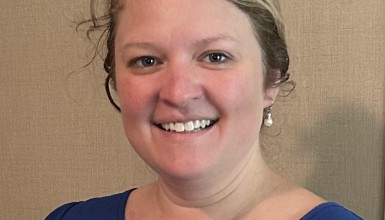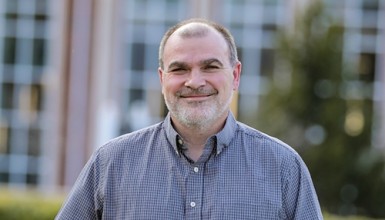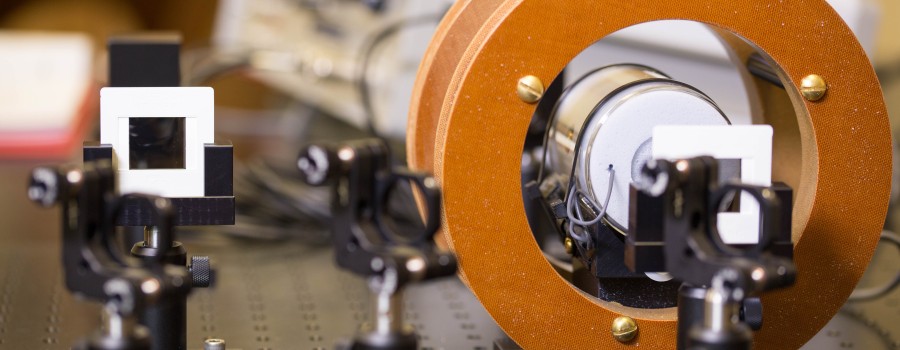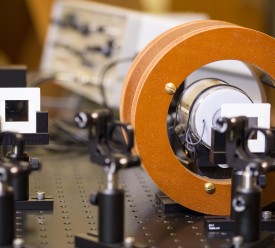Bring the world of physics to life for your future students.
Physicists understand that physics runs the world. You have a passion for mathematics as applied in the world of physics; bring that world to life for students of your own with the training you receive in this physics education degree program from University of the Cumberlands! Topics that will be covered in this degree include classical physics, theory, nuclear physics, quantum physics, chemistry, calculus, astronomy, and much more. You will gain skills in critical thinking, problem solving, and experimental physics – and that’s all on top of the experience you’ll get in your education classes, teaching you how to be a competent and caring educator.
By the Numbers
Programs & Requirements
* The credit hours listed on this page only reference the specific program requirements and is not reflective of the total hours necessary to receive your degree. Cumberlands requires all students obtain a minimum of 60 hours for an associate’s degree and a total of 120 hours for a bachelor’s degree. Transfer and prior learning credits may be counted toward those totals.
To learn more about our General Education Requirements, please visit the page referenced below or explore our Academic Catalog.
Bachelor of Science
If you have a passion for physics and teaching, this is a great place to start. As a physics student, you’ll have access to high-quality equipment for problem-solving, computation, and data acquisition, as well as a free math tutoring lab and physics laboratories for introductory and advanced-level courses. You’ll also lead experiments ranging from the traditional “inclined plane” to sophisticated computer data acquisition systems.
Faculty will train you to cultivate critical-thinking skills, apply physical principles, develop insights into experimental physics, and extend your mathematical prowess. And through it all, you'll be taking education courses to lay the groundwork for a successful and impactful career as an educator. The next generation needs to understand physics just as much as your generation. This is your chance to learn the material and how to teach it.
Course Requirements
- COMM 230 - Introduction to Public Speaking
- EDUC 130 - Technology in the P-12 Classroom
- EDUC 235 - Basic Concepts Concerning Education
- EDUC 237 - Effective Teaching Practices
- PSYC 232 - Child and Adolescent Development
- PSYC 238 - Educational Psychology
- SOWK 436 - Human Diversity in a Global Society
- SPED 233 - Survey of Individuals with Exceptionalities (P-12)
The following may not be taken until admitted into the Teacher Education program:
- EDUC 331 - Studies in Education: Special Topics in Literacy
- EDUC 432 - Fundamentals of Secondary Education
- EDUC 497 - Supervised Student Teaching
*Student Teaching placements determined by Director of Student Teaching the semester before Student Teaching begins.
A Bachelor of Arts degree requires completing the same courses as a Bachelor of Science with the addition of completing one foreign language sequence through the intermediate level.
- FREN 131 Elementary French I
- FREN 132 Elementary French II
- FREN 231 Intermediate French I
- FREN 232 Intermediate French II
- SPAN 131 Elementary Spanish I
- SPAN 132 Elementary Spanish II
- SPAN 231 Intermediate Spanish I
- SPAN 232 Intermediate Spanish II
The Physics Teaching major is for students seeking certification to teach at the secondary level (grades 8-12) either through the traditional undergraduate program or the Master of Arts in Teaching (MAT). Alternatively, students may choose to complete the Physics major while seeking secondary certification.
Course Requirements
- COMM 230 - Introduction to Public Speaking
- EDUC 130 - Technology in the P-12 Classroom
- EDUC 235 - Basic Concepts Concerning Education
- EDUC 237 - Effective Teaching Practices
- PSYC 232 - Child and Adolescent Development
- PSYC 238 - Educational Psychology
- SOWK 436 - Human Diversity in a Global Society
- SPED 233 - Survey of Individuals with Exceptionalities (P-12)
- The following may not be taken until admitted into the Teacher Education program:
- EDUC 331 - Studies in Education: Special Topics in Literacy
- EDUC 432 - Fundamentals of Secondary Education
- EDUC 497 - Supervised Student Teaching
- *Student Teaching placements determined by Director of Student Teaching the semester before Student Teaching begins.
Take the Next Step
Program Mission
The mission of the physics education program at University of the Cumberlands is to train competent educators through innovative exploration, rigorous academics, advantageous opportunities, and hands-on experience in the laboratory.
Cultivate critical-thinking skills
Apply physical principles
Develop skills in experimental physics
Expand knowledge in mathematics
Recognize your professional and ethical responsibilities
Physics Education Careers & Outcomes
All stats from U.S. Bureau of Labor Statistics
High School Teacher: $86,550
High School Teacher: $86,550
Teach courses about the laws of matter and energy. This includes both teaching and engaging in research.
Physicist: $142,850
Physicist: $142,850
Conduct research into physical phenomena, create theories based on observation and experiments, as well as devise methods to apply physical laws and theories.
Physics Professor: $86,550
Physics Professor: $86,550
Teach courses about the laws of matter and energy. This includes both teaching and engaged in research.
Natural Sciences Manager: $137,900
Natural Sciences Manager: $137,900
Supervise the work of chemists, biologists, hysicists, and scientists.
Statistician: $96,280
Statistician: $96,280
Mathematicians and statisticians analyze data and apply computational techniques to solve problems.
Biophysicist: $102,270
Biophysicist: $102,270
Biochemists and biophysicists study the chemical and physical principles of living things and of biological processes.
Common Questions
A physics education degree is a specialized program that prepares students to teach physics at various educational levels. This degree combines a strong foundation in physics concepts—including classical physics, nuclear physics, and quantum physics—with educational theory and practice, equipping graduates to effectively engage and educate students in the field of science.
Typically, a physics education degree takes about four years to complete if pursued as a bachelor's degree. This timeframe includes coursework in physics, mathematics, and education, as well as practical teaching experiences.
While some institutions may offer components of a physics education degree online, most programs require in-person laboratory and classroom experiences, especially for student teaching. It’s essential to check with specific universities to see if they offer a fully online or hybrid program.
Yes, a physics education degree can be worth it for those passionate about teaching and sharing knowledge of physics. Graduates can find rewarding careers as educators, with a positive job outlook in science education. Additionally, the skills gained can lead to opportunities in various related fields.
With a physics education degree, graduates can pursue careers as high school physics teachers, college physics instructors, physicists, natural sciences managers, and statisticians. These roles often involve teaching, research, and application of physics principles in various settings.
To obtain a physics education degree, enroll in an accredited university program offering a Bachelor of Science in Physics Education. Complete the required coursework in physics and education, and fulfill any student teaching or practical experience requirements.
Yes, a physics education degree qualifies you to teach physics, often at the high school level. Graduates typically need to obtain teaching certification or licensure in their state, which may involve passing specific exams and completing a student teaching experience.
Generally, becoming a physics teacher requires four years of college education to earn a bachelor's degree in physics education. Additional time may be necessary for obtaining teaching certification, depending on state requirements.
Per the standards set by Kentucky EPSB, “Candidates [for student teaching] in Kentucky are required to complete a minimum of 200 field experience hours prior to student teaching.” Each education course contains a prescribed number of field experience hours. Some courses will have more than others, and courses with more hours are distributed toward the end of the program. Before student teaching, the hours completed in courses will be 200 or more. It's hard to measure an average per semester, since it will depend on the courses you take, but rest assured that you will be able to complete all your necessary hours by the time you graduate.
Faculty Experts in Physics
Learn more about the physics professors you will interact with.

Amy Bowman

Debbie Pierce

Kenny Siler
Kenny Siler
Contact Information
Request Information
Have questions? Let us know!

